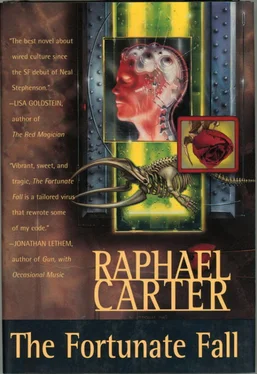Raphael Carter - The Fortunate Fall
Здесь есть возможность читать онлайн «Raphael Carter - The Fortunate Fall» весь текст электронной книги совершенно бесплатно (целиком полную версию без сокращений). В некоторых случаях можно слушать аудио, скачать через торрент в формате fb2 и присутствует краткое содержание. Город: New York, Год выпуска: 1996, ISBN: 1996, Издательство: Tor Books, Жанр: Киберпанк, на английском языке. Описание произведения, (предисловие) а так же отзывы посетителей доступны на портале библиотеки ЛибКат.
- Название:The Fortunate Fall
- Автор:
- Издательство:Tor Books
- Жанр:
- Год:1996
- Город:New York
- ISBN:0-312-86034-X
- Рейтинг книги:3 / 5. Голосов: 1
-
Избранное:Добавить в избранное
- Отзывы:
-
Ваша оценка:
- 60
- 1
- 2
- 3
- 4
- 5
The Fortunate Fall: краткое содержание, описание и аннотация
Предлагаем к чтению аннотацию, описание, краткое содержание или предисловие (зависит от того, что написал сам автор книги «The Fortunate Fall»). Если вы не нашли необходимую информацию о книге — напишите в комментариях, мы постараемся отыскать её.
“Gripping…. One of the most promising SF debuts in recent years”.
—“Publisher’s Weekly” starred review
The Fortunate Fall — читать онлайн бесплатно полную книгу (весь текст) целиком
Ниже представлен текст книги, разбитый по страницам. Система сохранения места последней прочитанной страницы, позволяет с удобством читать онлайн бесплатно книгу «The Fortunate Fall», без необходимости каждый раз заново искать на чём Вы остановились. Поставьте закладку, и сможете в любой момент перейти на страницу, на которой закончили чтение.
Интервал:
Закладка:
“I wasn’t sure how much I’d need—strangely enough, most medical books are geared toward saving people, not killing them; short-sighted, I call it. But I assumed that what I could harvest from twenty bodies would suffice. The fact that this would give me a death count three times that of Jack the Ripper was a regrettable, but, I thought, a necessary byproduct of this plan.
“From then on, whenever I saw that a prisoner was scheduled for surgery, I would come to him in the night and sit with him. I tried to persuade them to tell me their stories; not an easy task, once they began to realize that my approach meant death. But sometimes they were so afraid that they would talk to me—to anyone. If they would not, I studied the lines of their faces and the calluses on their hands, trying to deduce who they had been. And what I could not deduce, I invented.
“At dawn I left them. Hurriedly, in the last hours before Derzhavin arrived, I wrote down their stories and carefully hid the papers away.
“Derzhavin’s experiments did not have a high survival rate. However, on those rare occasions when a patient might have pulled through, I made sure that he did not. Then, again at night, I would begin those portions of the autopsy that I was permitted to perform myself—always most scrupulously, checking off ‘autoimmune complications’ for the man who rejected his head transplant, and ‘natural causes’ for the woman whose heart attack might conceivably have been induced by waking up to find a cable trailing from her skull. And when the last of the paperwork was done, I would remove the patient’s pancreas and go to work. I think nothing else has given me such joy as taking those lumps of flesh and refining them, with hands and glass and centrifuge, into a liquid as clear as the water that Katya had poured into my head.
“Finally, after months of work, the drug was ready, and so was I. All I needed was a clear shot at a vein. But that day he came in worried, and he paced and would not sit down. I asked him if he wanted tea, but he ignored the offer. I suggested a game of chess— anything, if he would just hold still—but he refused. Finally he said, ‘Sit down, Voskresenye. You may as well know what’s happening.’ It was the autumn of 2246.”
“The Awakening had already happened.”
“Yes.” Voskresenye looked into the distance. “Of course I didn’t see it. I was down here, cut off; and though some of the prisoners may have known, I was the last person they would have discussed it with. But from Derzhavin’s description, I thought it must have been a little like the Rapture, the way the evangelists used to talk about it on Guardian radio. Four people would be riding in a car, and suddenly the driver would hit the brakes, get out, and walk away, deaf to all shouts. A man would wake from sleep to see his wife going out the door, carrying, for reasons only the Army knew, a hockey mask, a spaghetti strainer, and a cuckoo clock. They all walked out into the streets and mustered into clumps, and each clump lifted up a memory cell and began to march.
“By noon on that first day, the Army had seized the entire world socket industry, and was drilling people fast enough to add ten thousand recruits every hour. Every boat and plane in America was on its way to the Eastern Hemisphere, its holds tessellated with soldiers. By the time the Guardians found out what was happening, they faced an army of thirty million soldiers without fear— not along a border where they might be held back, but in every city. America and Japan, with nearly a third of their populations already socketed, were under Army control within a month. It was a threat like nothing the Guardians had ever faced, or even imagined. The Russian Heptarch, and he alone, still had a usable army and a populace largely intact—but half the world was marching to his doorstep.
“And through all this, Derzhavin was unaffected. His confidence in the Guardians approached the status of religious faith; he had assumed that they would find some way to stop the Army’s progress. But now, he said, he could not put off telling me any longer. The order to evacuate had come. The Army was about to reach Arkhangelsk.
“All this he told me as he paced around the room like Rilke’s panther. And as excited as I was to find that the Guardian regime might be over, the first thing on my mind was to make that man stand still. So I began to brew some tea, to calm his nerves, I said; surely he would at least sit down to drink it. As I was making it I asked him whether I would be evacuated. He looked away. ‘I’ll do what I can,’ he said sadly. ‘You, I could take easily. But I don’t know what to do about the whale, and without—’
“‘We’ll work it out somehow,’ I said. ‘Just sit down and relax. It’s no use trying to make plans while you’re this tense.’
“At last he sat down at the chess table. He fidgeted with the pieces for a while, then began to set them up. ‘Once more—for old time’s sake?’ he said.
“‘Of course, if that’s what you want,’ I answered, taking the strainer from the teapot.
“‘I suppose we’ll have to euthanize the subjects and start fresh,’ he said regretfully. ‘We can’t move them all. But we’ll still have the data. Voskresenye, we must keep the data secure.’
“‘Of course we will,’ I said. ‘Don’t worry about that now.’ I stood behind him, set down a cup and saucer on the gaming table, and picked up the teapot. ‘Think about—’ And I poured the whole pot of scalding tea onto his lap. He jumped up, driving his neck against the needle I was holding behind him. I pressed the plunger, and he was as good as dead.
“Since I hadn’t hit a vein, the poison would take some time for its effect. So I ran into the next room and locked myself into an empty cell. In case he had an extra key I didn’t know about, I took out a knife that I had earlier secreted under the mattress; I could not use it effectively, but in his insulin stupor, it might scare him off. I expected him to come after me, to rage at me, perhaps to call a guard—in which case I would die with him. But for a long time he did not come. And when he did, it was only to lean his head against the bars of the cage, look at me in bewilderment, and ask ‘Why?’ He had no idea why I had killed him. He had murdered thousands, and he had never believed in his heart that somebody might take it amiss.”
“Wait a minute,” I said. “When we talked before, you said you were ‘a good deal more’ to Derzhavin than just a lab assistant. What did you mean by that?”
“I suppose I could have phrased that better. You imagined— what? Steamy sexual encounters? Male bonding rituals? Fishing trips?” He laughed, then grew serious, stroking the wires of his hands. “I was his murderer. What relationship could be more intimate?”
To the audience, all this was another revenge drama—something off a soap channel. To them, protected from the action as they were, Voskresenye’s behavior might have seemed perfectly rational. But in the chambers of my mind that were my own, I began to wonder just how dangerous a man I was a thousand meters underground with.
“Derzhavin died as I was trying to find words to answer him,” Voskresenye said. “And so I never got to ask him the question that had haunted me since I awoke: What was I for? I knew the purpose of his research: he was looking for a way to heal the brain-damaged, and to resurrect the brain-dead. But you do not perform basic research with whales; it is not cost-efficient. I was designed to do something; and I do not know what, to this day.”
“What do you suspect?”
“I suspect,” he said, “that I was to be a military strategist. I suspect I was designed to outwit the Army. I suspect that is what the chess games, and certain other tests, were for.”
Читать дальшеИнтервал:
Закладка:
Похожие книги на «The Fortunate Fall»
Представляем Вашему вниманию похожие книги на «The Fortunate Fall» списком для выбора. Мы отобрали схожую по названию и смыслу литературу в надежде предоставить читателям больше вариантов отыскать новые, интересные, ещё непрочитанные произведения.
Обсуждение, отзывы о книге «The Fortunate Fall» и просто собственные мнения читателей. Оставьте ваши комментарии, напишите, что Вы думаете о произведении, его смысле или главных героях. Укажите что конкретно понравилось, а что нет, и почему Вы так считаете.












